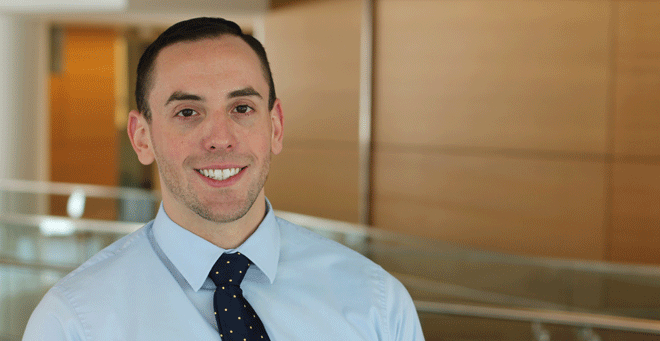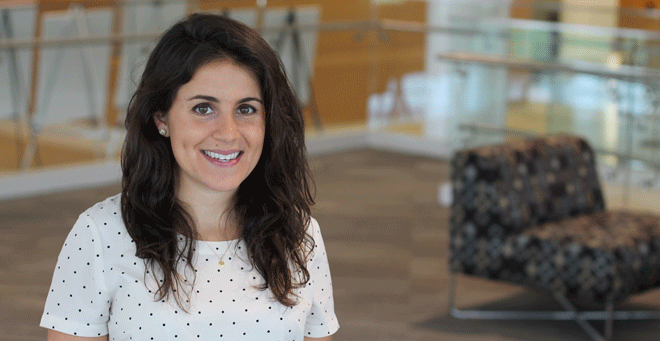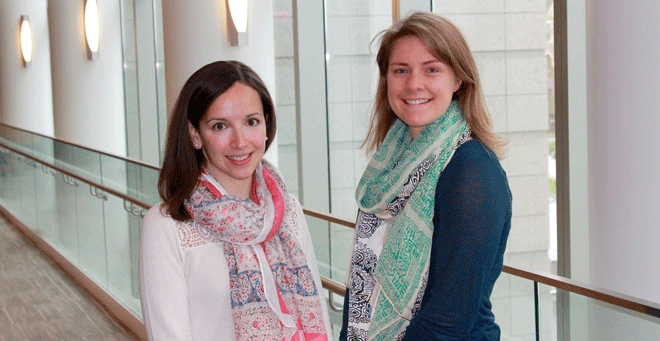When the School of Medicine Class of 2016 graduates from UMass Medical School on Sunday, it will be the first class in the school’s history to complete long-term capstone projects, many of which focused on improving lives in the Worcester community.
Malek Mazzawi helped families of children with asthma reduce their absences from school by improving their home environments, making them less prone to asthma attacks. Micaela Atkins worked to help the homeless manage their diabetes. Kathryn Bailey and Rachel Erdil established a local fresh food program to provide free produce to food-insecure families in Worcester.
“Capstones provide a mechanism for focused, experiential learning within our broad-based curriculum. This type of mentored, independent project is the way much of medical scholarship occurs in practice," said Melissa Fischer, MD, MEd, associate dean for undergraduate medical education and associate professor of medicine. “The scope and depth of work our students complete in this course is truly inspiring.”
A requirement of the School of Medicine’s Learner-centered Integrated Curriculum, the Capstone Scholarship and Discovery Course is an individualized, mentored, scholarly project undertaken across all four years of medical school. The 78 projects of this year’s graduates showcase a range of endeavors in community service, research, education, history and humanities.
 |
|
|
Malek Mazzawi, MS, SOM ’16 |
“I knew I wanted to work with kids before I knew I wanted to go into medicine, making it easy for me to pick a capstone project allowing me to work with a pediatric population and promote prevention of the number one preventable pediatric illness, asthma,” said Mazzawi, who matched at Tufts Medical Center for his pediatrics residency. With his project “Reducing asthma-related school absences at Worcester Head Start through educational interventions,” Mazzawi developed an educational intervention for parents of children enrolled in Head Start to help them reduce environmental contaminants in their homes, such as mold, smoke, pests and cleaning supplies, that might trigger asthma attacks and lead to school absences.
“I found that I enjoyed doing educational interventions with parents, and my capstone experience underscored that pediatrics is about working with the parents as well as the kids,” Mazzawi said. Second-year medical student Jeffrey Sumner will continue the work, implementing further interventions and assessing their effectiveness with pre- and post-intervention surveys with parents. “This model is a great way to get data on the parents’ understanding of all the things that can cause kids to have asthma exacerbations,” Mazzawi said.
 |
|
|
Micaela Atkins, SOM ’16 |
Capstones need not be directly related to the student’s eventual area of practice. Atkins, who is going into pediatrics, chose as her capstone “Assessing diabetes self-management in Worcester’s homeless population” after being inspired by volunteer work she did at Community Healthlink’s Homeless Outreach and Advocacy Program.
“I came into medical school knowing I wanted to work with vulnerable and underserved populations, so I wanted to do a project focused on one in Worcester,” she said. “The opportunity for me to dive in and work with the great interdisciplinary care team at the program was great.” She learned about the multiple challenges faced by adults coping with housing insecurity and a chronic disease that requires rigorous self-care, including a healthy diet that is often out of their reach.
Atkins is confident that she will use the knowledge and skills she gained from her capstone as a pediatric resident at Massachusetts General Hospital.
“I will have homeless patients and patients with diabetes—more and more kids are getting type 2 as well as type 1 diabetes,” she said. “What I’m taking away from my work with homeless adults is being able to look at all the varying factors in a patient’s life and the barriers they may face in achieving the lifestyle modifications that will help me help them.”
 |
|
|
Rachel Erdil, MS, SOM ’16 (left) and Kathryn Bailey, SOM ’16 |
Bailey and Erdil’s capstone, “Farm to health center initiative: Striving to address food insecurity in Worcester, MA,” expanded on a volunteer extracurricular project they initiated during their second year with then-first year student and collaborator Elizabeth Rosen.
In partnership with the Community Harvest Project and the Worcester Family Health Center, Bailey, Erdil and Rosen identified patients who were food insecure and provided them with locally grown fresh produce at no charge. They also educated physicians and other providers at Family Health Center about the negative health effects of food insecurity, and how to screen patients and identify those at risk.
“The three of us came into medical school with an interest in nutrition,” recalled Bailey, who was previously a research and policy analyst for Children’s Health Watch, a multidisciplinary consortium that monitors how economic conditions affect children’s health. “We started by asking questions about what’s already happening in Worcester and identifying a gap in how the communities and the health centers were addressing food insecurity.”
Erdil, who earned her master’s in environmental science at Trinity College in Dublin and worked for Ireland’s environmental protection agency for three years before entering medical school, was looking for a way to bring her population-level interests into the clinical realm. “I wanted to explore how I could address some of these issues with my patients,” said Erdil, who will begin her medicine/pediatrics residency at Massachusetts General Hospital and intends to incorporate nutrition as part of routine patient care.
Other capstone projects reflect the breadth and depth the educational opportunity affords students, and the diverse health care interests of the graduates.
They include “Reducing burnout among medical students: An analysis of the Healer’s Art implementation at a U.S. medical school” by Benjamin Adler; “Stories Through a Lens: Understanding Patients’ Experiences and Needs at St. Anne’s Free Medical Clinic,” a photo exhibit by Mayur Contractor; and “The effect of pre-operative mental health on post-operative total hip replacement patient function and pain status,” a clinical research study by Timothy Boardman.
Related links on UMassMedNow:
McGovern, Pelosi spotlight UMMS student-run Farm-to-Health Center Initiative as a model for the nation
Telegram: UMMS students write ‘prescription’ program for fresh produce
UMMS students partner in service with community organizations
Honoring MLK, students seek to strengthen community relationships
Approval of fourth-year curriculum marks a milestone
A new way of teaching medicine begins with School of Medicine’s entering class